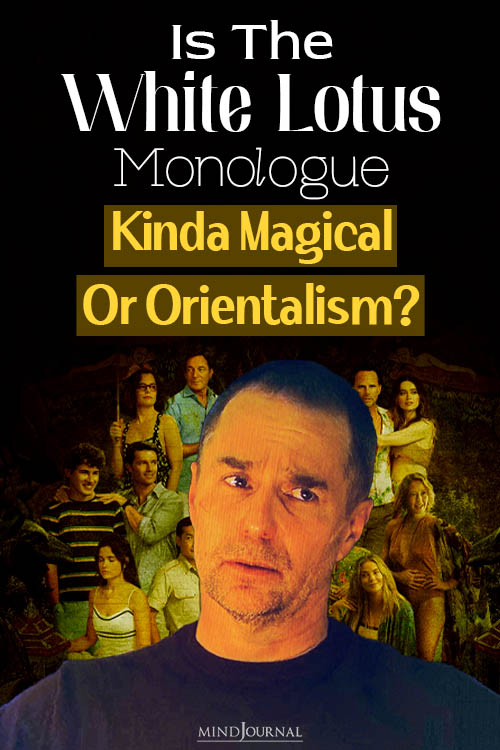What an explosive “White Lotus” scene reveals about sex and gender.
Key points
- “The White Lotus” has introduced novel models of masculinity.
- San Rockwell’s monologue in a recent episode injected unbridled sexual energy into the series.
- The series’ current season balances sexual revelation with persistent Orientalist tropes.

The online world has become obsessed with Sam Rockwell’s superlative monologue from episode 5 of the third season of The White Lotus, which aired on March 16. (The season’s action takes place at a luxury resort in Thailand.)
Read More Here: 5 Identifying Signs Of Destination Anxiety: Know Before You Go
Hailed by Cosmopolitan as the “one of the most bonkers monologues in television history” and by Vanity Fair as “one of the most surreal monologues ever seen on TV,” it’s the Zip-file version of the heteroflexible hero’s journey over chamomile tea.
What makes it so bonkers and surreal? It’s how Rockwell’s character, deliciously named Frank, calmly details his descent into sex and drug addiction alongside a scorching desire to explore the limits of his sexuality, gender, and the confines of his own body by becoming someone else—in his case, an “Asian girl.”
While sipping tea, he explains to his stupefied yet also beautifully present friend Rick (Walton Goggins) that he first journeyed to Thailand because he always had a thing for “Asian girls.”
The sex- and drug-fueled rampage he embarked upon to satiate this desire, he says, included women of all body shapes, ages, and even some “lady boys,” a unique experience he describes as “kinda magical.”

But after a “thousand nights” of these hollow conquests he lost it mentally and realizes that he didn’t want to have sex with these women anymore; he wanted to be one of them.
Frank then began dressing like a woman and cruising for men to sleep with him, which led to another smorgasbord of anonymous partners, one of whom looked a lot like himself, and some of whom he paid.
Cue Rick’s bug eyes, breathless nods, and long slurps of Dewar’s whiskey from a thick ribbed glass.
After sharing his journey through multiple addictions, Frank brings us to the pinnacle of this search for himself inside the bodies of other people. He wonders, “Am I middle-aged white guy on the inside, too? Or, inside, could I be an Asian girl?” Frank then declares: “I am her. And I’m f–ing me,” as he reflected on making eye contact with the women he paid to watch him get “railed” by all these men.
Rockwell’s “monologue for the ages” has been celebrated by some as a vulnerable dismantling of masculinity as well as normative cisgender desire.
It’s even being called a haunting ode to the bliss of death itself, especially the Buddhist interpretations that Frank now follows: no more suffering, no more being pressed into service through the limited form of our physical bodies. The ultimate release.
Frank closes this dizzying story by saying that being sober isn’t too tough, but being celibate is. “I miss that pu**y, man,” he says with the sly grin so expertly delivered by Rockwell.
This hypnotic scene is brilliant in the way it pushes back against the heavy weight of traditional masculinity to reveal a dark and exciting underbelly of possibility. Desire is a compass and his body the needle that leads him into many layers of sexual and gendered discovery, of other people and of himself.
More men need to feel safe to share their diverse interests and fantasies, and it will be fascinating to see how this scene influences pop-culture representations of masculinity and sexual exploration going forward.
The White Lotus Begins to Wilt
However, this unforgettable monologue hinges upon a less sexy and more uneasy trope that has received little attention thus far. I’m referring to its monolithic trope of the “Asian girl,” which smacks of old-school Orientalism. This refers to the imperialist traditions of viewing the Orient, which is a fictional land and group of people given the fact that there is no singular “Orient,” through the lens of the West. The West in this tradition is the normative yardstick against which the “Orient” is constructed; primarily as less than—the classic “Other.”
These ideas drench Frank’s monologue, in which he never once refers to the women he’s slept with as women, or as Thai, or as belonging to any of the other cultural groups common in Bangkok. They are all “Asian girls.” He speaks of inhabiting the body of an Asian girl, or possibly being one, simply by dressing up like the women, or girls, he sees around him.
Identity is not a costume, and what of Thailand itself? Is it just a passive background for foreign imagination and sexual experimentation? Remember, Frank escaped to Thailand, and it was there, not at home in the US, that he was able to live out his fantasies.
This aspect of Rockwell’s monologue parallels the real-life neo-colonial sojourns of many a white middle-aged man who has visited or moved to Southeast Asia for sex tourism. Racist and highly sexualized stereotypes fuel this industry, alongside the economic inequities that dictate the many ways in which the global South caters to the needs of greedy, wealthy men from the global North.
Read More Here: Girls Just Wanna Have Fun (And Not Fight): How To Survive Girls Trip Without Coming Home As Enemies
These critiques are, I’m sure, not lost on award-winning series creator Mike White. As a satirical series, many of the overt and hidden messages in The White Lotus series poke fun at how gross and terribly ignorant wealthy Western tourists can be. Despite this apparent anti-tourism messaging, the locations at which the popular show have been shot report more visitors than ever in what has been dubbed “The White Lotus effect.”
Magical Orientalism
Could that term be a way of describing Rockwell’s now epic few minutes? It seems that his monologue is both magical and Orientalist, and that’s cause for critical reflection. Like millions of other viewers, I can’t wait for the next installment of this engaging if somewhat maligned series. Will Frank resurface? Will his adventurous ways rub off on his friend Rick? All we can do is wait and see.
Share your thoughts on the White Lotus effect in the comments below!
Written by: Treena Orchard, Ph.D.
Originally appeared on: Psychology Today




Leave a Reply